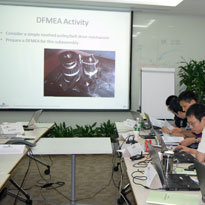Root Cause Analysis of Systems Failure Overview
- Course:Root Cause Analysis of Systems Failure Overview
- Course ID:RCFA2D Duration:2 days Where: Your Office (7+ Persons)
- Download Course Description (PDF)
Available as a private, customized course for your group at your offices or ours and in some cases as a WebLive(TM) class.
Course Outline
- Day 1: Introduction to Systems Failure Analysis
- The need for efficient systems failure analysis
- Systems failure analysis philosophy
- The four-step problem solving approach
- Systems and component failure analyses
- The inherent value of failed hardware
- Continuous improvement concepts and systems failure analysis
- Quality measurement and reporting concepts
- Using failure analysis as a preventive measure
- The value of a priori failure cause identification
- Brainstorming, mind-mapping, and Ishikawa diagrams
- Fault tree analysis history, applications, and capabilities
- Fault tree analysis construction
- Fault tree gate usage and interpretation
- Quantifying top undesired events
- Using fault trees to identify redundancy-defeating failure modes
- Case study
- Day 2: Isolating Failure Causes and Corrective Action
- Evaluating potential failure modes
- Using Failure Mode Assessment and Assignment (FMA&A) matrices
- “What’s Different” analysis
- Test and inspection data, material certifications, and SPC data
- Using flow charts for product performance and process evaluations
- Interviewing techniques for use with assembly, test, and inspection personnel.
- Failed hardware analysis
- Evaluating failed hardware conformance
- Component failure analysis technologies, including optical microscopy, SEM, FTIR, EDAX, X-ray, N-ray, SIMS, and Auger analysis
- Basic metallurgical and electronic component evaluations
- Evaluating leaks
- Designing tests to confirm failure causes
- Corrective action alternatives, including design modifications, process modifications, requirements relaxation, screening, and other corrective actions.
- Using the FMA&A matrix for corrective action identification and tracking
- A suggested failure analysis procedure
- Creating a product-oriented Lessons Learned document
- Recap, Q/A, and evaluations
Course in a Nutshell
This short tutorial brings together essential concepts from engineering, quality assurance, problem solving, procurement, and other disciplines to identify and eliminate the root causes of failures occurring in complex systems, subsystems, and components. The course emphasizes the development and implementation of a failure analysis methodology for use throughout the organization.
We will show you how to utilize brainstorming, Ishikawa diagrams, mind-mapping, and fault tree analysis for identifying potential failure causes. We will also arm you with procedures and technologies for working through various types of systems failures. We will learn how hardware analysis, statistical analysis, design of experiments, technical data package evaluation, and other pertinent tools and techniques can be brought together to define potential root failure causes, and to develop a plan for evaluating these causes. The course presents corrective action alternatives and a framework for selecting optimal intermediate and longer-term corrective actions. The course utilizes real-life case studies to help you apply this toolkit effectively to your job. At the end of the course, you will have learned how to identify dominant failure modes through quantity and cost-based Pareto analyses, identify the root causes of systems failures, select and implement effective corrective actions, and work as an inter-organizational, multi-disciplinary failure analysis team.
Customize It!
Whatever the nature of your system and objective, whether failure prevention or cause determination, we will customize the course to meet your specific needs and concerns. Here are some of the ways in which we can tailor the course to help you get more out of it:
- Add a “workshop day” to the course to allow the participants to work together to analyze a failure specific to your organization. The workshop day can be scheduled a few weeks after the course to allow time for applying the technologies presented in class under an experienced failure analysis practitioner’s guidance.
- Add a design-of-experiments and Taguchi training module.
- Schedule post-class follow-up consultation for continuing in-house product and process failure analyses.
Learn How To
- Work together in an effective multi-disciplinary team environment to resolve complex system failures.
- Objectively identify all potential failure causes using fault tree analysis and other technologies.
- Objectively evaluate the likelihood of each potential failure cause.
- Identify the most likely failure causes.
- Proactively eliminate additional potential failure causes before they occur.
Aimed At
This course is aimed at engineers, project engineers, design engineers, process engineers, program managers and others responsible for preventing or determining the causes of systems failures.
Prerequisites
While there are no formal prerequisites, the course does assume a process, industrial, manufacturing, or engineering background.
- “Really liked Fault Tree Analysis. Very good presentation. Well done!” – Supervisor, Major Locomotive Manufacturer
- "Very knowledgeable, made the course interesting. Really enjoyed the practical related examples. The course book is very easy to follow along. Thanks, Joe, great learning from you." – DM, Sr. Manager, Mechanical Engineering, North American Power Producer
- "Joe is very well spoken and he obviously has a solid background in RCFA. Slides are well-detailed and in logical order. It's a terrific intro to RCFA and Fault Tree Analysis. I have things I can start doing now to get better RCFAs" – AB, Manager - Process Engineering, Major Energy Company

